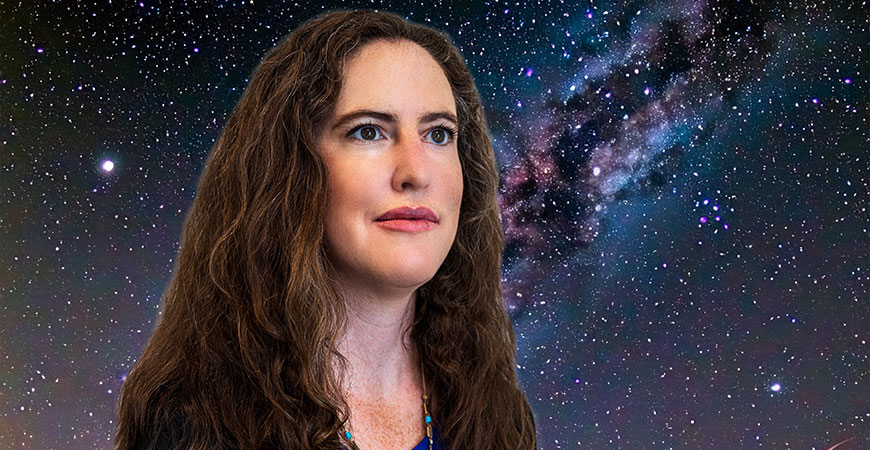
Cosmology Professor Anna Nierenberg has received a CAREER award for a project that will vastly improve the study of the nature of dark matter in the universe.
She is the 42nd researcher from UC Merced to earn a CAREER award from the National Science Foundation (NSF).
CAREER awards are among the NSF’s most prestigious awards. They are given through the Faculty Early Career Development Program to recognize untenured faculty members as teacher-scholars. Early career faculty members are selected based on the strength of their research proposals, their potential to serve as academic role models in research and education, and their leadership in their fields and organizations.
Nierenberg will receive $867,277 over the next five years from the Division of Astronomical Sciences for the project “An Order of Magnitude Improvement in Measurements of the Physical Properties of Dark Matter.”
She and her lab will focus on using gravitationally lensed quasars to study the nature of dark matter. Using high-spatial-resolution spectroscopy, Nierenberg will measure positions and flux ratios for 200 multiply lensed systems — an order of magnitude more than the existing number of similar measurements.
Several new space telescopes are coming online in the next few years, including one in the Atacama Desert in Chile. This extremely sensitive telescope will find many of the previously unseen quasars Nierenberg will study. Then, she will use UC's Keck Observatory to make her measurements.
“As a consequence of general relativity, massive things bend space-time,” Nierenberg explained. “A massive galaxy will bend space-time and the path of light so much that we see multiple images of the background quasar. The kind of particle dark matter is made of will affect the structure distribution as the light travels through the universe. So, the lens will look slightly different depending on what kind of dark matter particle it is.
“The lensing is a unique probe because I don't have to see the dark matter structure to see its gravitational effects on the light as it travels through the universe,” she said. “With the gravitational lensing, I can test dark matter models that you can't test with other methods.”
Working with colleagues worldwide, Nierenberg will try to find dark matter halos — a hypothetical region decoupled from cosmic expansion and containing gravitationally bound matter. Dark matter halos are key in current galaxy formation and evolution models.
In her proposal, she wrote that the data gathered will be used to determine the relative number of dark matter halos well below the mass threshold for galaxy formation, the presence of dark matter particles with high enough velocities to impact galaxy formation and galaxy clustering, and to confirm or exclude the existence of entirely dark halos.
Nierenberg has been with UC Merced since 2020. She is a member of the Department of Physics in the School of Natural Sciences.
Each CAREER award proposal includes an educational outreach component, and this one provides training and mentoring a postdoctoral scholar and graduate students, Bobcat Summer STEM Academy curricula in STEM topics targeting fourth and fifth graders, course curriculum development in General Relativity and a public lecture series on Nierenberg’s research.
Nierenberg was excited to learn she had received the CAREER award.
“This grant will be critical to my research over the next few years, and I am incredibly grateful to have taxpayer support for this,” she said.






